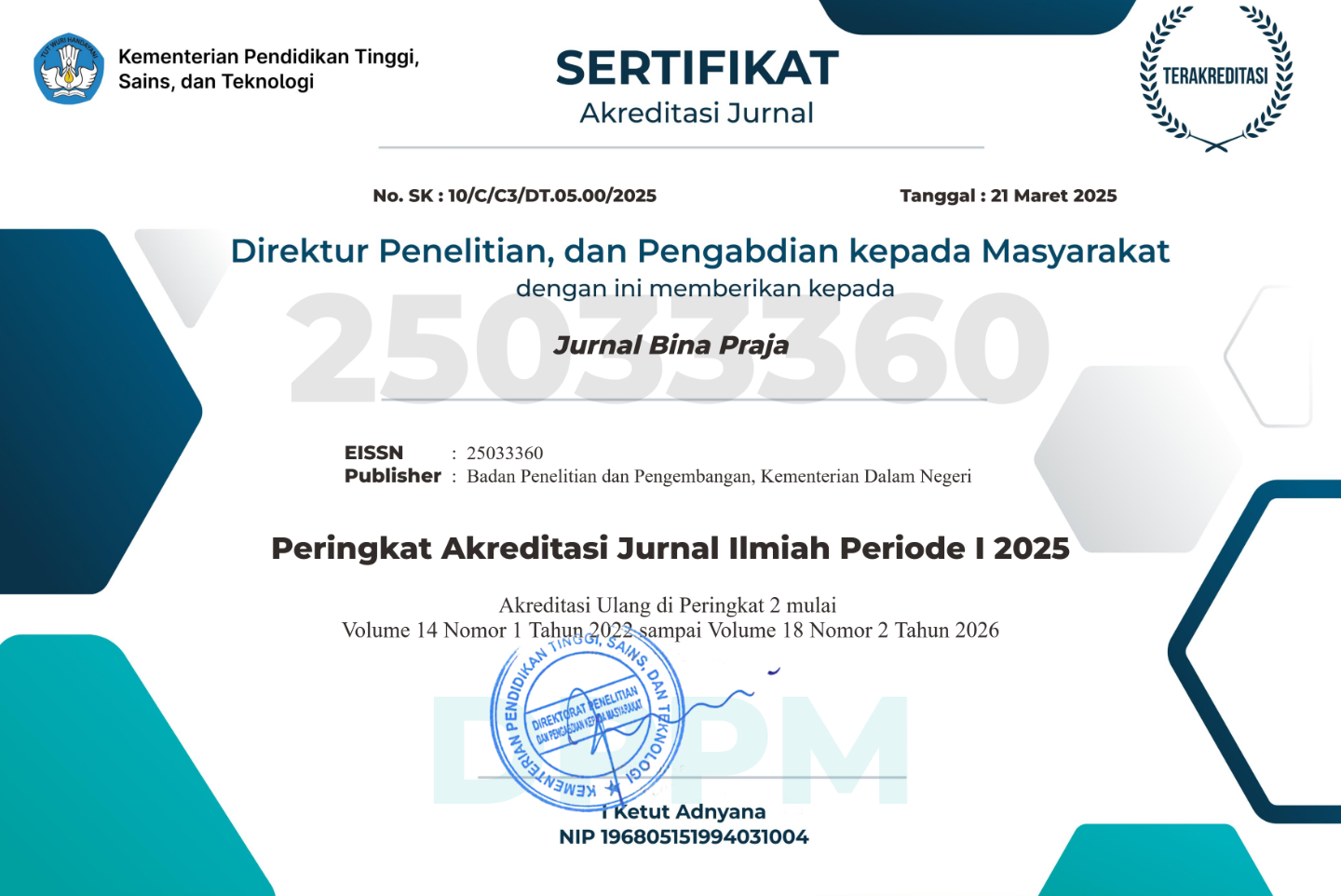The Effects of Social Capital for the Management of Environment Cleanliness in Adipura Programme
DOI:
https://doi.org/10.21787/jbp.08.2016.175-185Keywords:
social capital, environment cleanliness, Adipura programmeAbstract
Social capital is a decisive factor in the management of environment cleanliness in Adipura Programme. Tenggarong City in achieving clean city has attempted various strategies, including by considering the community social capital factor. Adipura Award for Tenggarong City is unsustainable, indicating that the role of community social capital is not yet optimized. This research aims to analyse the effects of social capital for the management of environmental cleanliness. The instrument used is the questionnaire. The sampling collection technique uses the simple random sampling method, with the sample of 100 respondents. The analysis instrument used to test the hypotheses is Product Statistics and Service Solution (SPSS) Program version 13.0 for windows. The research result shows that community social capital positively and significantly affects the management of environmental cleanliness. Trust element positively and significantly affects the management of environment cleanliness. Cooperation and social norm elements positively but not significantly affect the management of environment cleanliness. It is recommended to Kutai Kertanegara Government to always optimize the active role of community. Community Social Capital should be used optimally.
Downloads
References
Andrews, R. (2010). Exploring the Impact of Community and Organizational Social Capital on Government Performance: Evidence from England. Political Research Quarterly, 64(4), 938-949. http://dx.doi.org/10.1177/1065912910381649
Arsyad, L., Satriawan, E., Mulyo, J., & Fitrady, A. (2011). Strategi Pembangunan Perdesaan Berbasis Lokal. Yogyakarta: UPP STIM YKPN.
Cahyani, F. (2015). Strategi Pemerintah Kota Bontang dalam Mencapai Penghargaan Adipura Tahun 2014. Ejournal Ilmu Pemerintahan, 3(2), 1197-1210. Retrieved from http://ejournal.ip.fisip-unmul.ac.id/site/?p=1354
Cahyono, B. & Adhiatma, A. (2012). Peran Modal Sosial dalam Peningkatan Kesejahteraan Masyarakat Petani Tembakau di Kabupaten Wonosobo. Conference In Business, Accounting, And Management (CBAM), 1(1), 131-144. Retrieved from http://jurnal.unissula.ac.id/index.php/cbam/article/view/128/104
Daluarti, M. (2015). Peranan Ruang Publik Perkotaan terhadap Pengembangan Modal Sosial dan Peredam Patologi Sosial (Survey pada Siswa SMA di Kota Bandung) (Doctorate). Indonesia University of Education (UPI).
Fotovvat, S., Safari, K., Zayyari, K., & Boostani, S. (2014). A Study on Relationship Between Social Capital and Sustainable Development. Management Science Letters, 4(9), 2117-2120. Retrieved from http://growingscience.com/beta/msl/1713-a-study-on-relationship-between-social-capital-and-sustainable-development.html
Hadi, S. (2014). Profil Modal Sosial dan Tingkat Partisipasi Peternak pada Pengembangan Sapi Potong di Kabupaten Tebo Propinsi Jambi. Kanal, 2(2), 107-122. Retrieved from http://journal.umsida.ac.id/page.php?p=abs&id=393
Kitchen, P., Williams, A., & Simone, D. (2012). Measuring Social Capital in Hamilton, Ontario. Social Indicators Research, 108(2), 215-238. http://dx.doi.org/10.1007/s11205-012-0063-3.
Lubis, R. (2011). Kajian Teoritis Modal Sosial dalam Pengembangan Klaster. http://repository.uksw.edu. Retrieved 26 February 2016, from http://repository.uksw.edu/bitstream/123456789/726/3/D_902005007_BAB%20II.pdf
Lusiyana, N., Setiawan, A., & Buchari, H. (2014). Kajian Efektivitas Program Adipura Sebagai Upaya Mendukung Pembenahan Tata Lingkungan Kota Bandar Lampung. Jurnal Sains Dan Pendidikan, 1(2), 29-37. Retrieved from http://journal.pasca.unila.ac.id/index.php/jsp/article/view/18/16.
Ministry of Environment,. (2014). Regulation of Minister of Environment No 6 of 2014 on the Guidelines of Adipura Programme. Ministry of Environment.
Neolaka, A. (2008). Kesadaran Lingkungan. Jakarta: Rineka Cipta.
Pontoh, O. (2010). Identifikasi dan Analisis Modal Sosial dalam Rangka Pemberdayaan Masyarakat Nelayan Desa Gangga Dua Kabupaten Minahasa Utara. Jurnal Perikanan Dan Kelautan Tropis, 6(3), 125-133. Retrieved from http://ejournal.unsrat.ac.id/index.php/JPKT/article/view/156/122
Pramono, S. (2012). PNPM Mandiri Perkotaan Kabupaten Kendal. JEJAK (Jurnal Ekonomi Dan Kebijakan), 5(2), 117-229. Retrieved from http://journal.unnes.ac.id/nju/index.php/jejak/article/view/3903/3545
Putri, I. & Hidayat, H. (2011). Analisis Persepsi Modal Sosial (Social Capital) dan Hubungannya dengan Eksistensi Kelompok Tani (Kasus pada Kelompok Tani Wanita “Sri Sejati2â€, Desa Junrejo, Kecamatan Junrejo, Kota Batu). Jurnal Wacana, 14(1), 11-17. Retrieved from http://wacana.ub.ac.id/index.php/wacana/article/view/235/205
Rijal, M. & Noer, S. (2013). Peran Modal Sosial dalam Pelestarian Hutan. Jurnal Kebijakan Dan Administrasi Publik, 17(2), 20-36. Retrieved from https://journal.ugm.ac.id/jkap/article/view/6852/5359
Rohmani, S. (2015). Dampak Modal Sosial dalam Pengelolaan Irigasi terhadap Kesejahteraan Petani di Kabupaten Sukoharjo Jawa Tengah. Informatika Pertanian, 24(1), 67-90. Retrieved from http://ejurnal.litbang.pertanian.go.id/index.php/IP/article/view/2509.
Secretariat of State of the Republic of Indonesia,. (2009). Law of the Republic of Indonesia No 32 of 2009 on the Protection and Environmental Management. Jakarta: Secretariat of State of the Republic of Indonesia.
Sedana, G. (2013). Modal Sosial dalam Pengembangan Agribisnis Petani pada Sistem Subak di Bali (Doctorate). Universitas Udayana.
Sedarmayanti, & Hidayat, S. (2002). Metodologi Penelitian. Bandung: CV. Mandar Maju.
Sidik, M. (2011). Peran Adipura pada Pelaksanaan Sistem Pengelolaan Sampah di Indonesia. J. Tek. Ling, 12(3), 319-331. Retrieved from http://www.kelair.bppt.go.id/Jtl/2011/vol12-3/11adipura.pdf
Statistic Center Agency of Kutai Kartanegara Regency,. (2015). Kecamatan Tenggarong dalam Angka 2015. Tenggarong: Statistic Center Agency of Kutai Kartanegara Regency.
Suandi,. (2007). Modal Sosial dan Kesejahteraan Ekonomi Keluarga di Daerah Perdesaan Provinsi Jambi (Doctorate). Bogor Agricultural University.
Sugiyono,. (2012). Metode Penelitian Kombinasi (Mixed Methods). Bandung: Alfabeta.
Thobias, E. (2013). Pengaruh Modal Sosial Terhadap Perilaku Kewirausahaan (Suatu Studi pada Pelaku Usaha Mikro Kecil Menengah di Kecamatan Kabaruan Kabupaten Kepulauan Talaud). Jurnal Acta Diurna, 2(2). Retrieved from http://ejournal.unsrat.ac.id/index.php/actadiurna/article/view/1412.
Trajuningsih, T. (2015). Perubahan Sistem Pengelolaan Sampah sebagai Dampak Perubahan Modal Sosial (Studi Kasus Kampung Badran RW 11 Kelurahan Bumijo, Kecamatan Jetis Yogyakarta) (Undergraduate Theses). Universitas Sebelas Maret.
Widjanarko, M. (2016). Modal Sosial Masyarakat Desa Rahtawu: Studi Kasus Pelestarian Hutan Muria di Kabupaten Kudus. Jurnal Masyarakat dan Budaya, 18(1), 109-120. Retrieved from http://jmb-lipi.or.id/index.php/jmb/article/view/344.
Widodo, A. (2016). Modal Sosial dalam Pengelolaan Bank Sampah (Master Thesis). Universitas Gadjah Mada.
Winarni, I. (2011). Keterkaitan Antara Modal Sosial Dengan Produktifitas pada Sentra Bawang Merah di Kecamatan Pengalengan Kabupaten Bandung (Master Thesis). Universitas Indonesia.
Yuanjaya, P. (2015). Modal Sosial dalam Gerakan Lingkungan: Studi Kasus di Kampung Gambiran dan Gondolayu Lor, Kota Yogyakarta. Natapraja - Jurnal Kajian Ilmu Administrasi Negara, 3(1). Retrieved from http://journal.uny.ac.id/index.php/natapraja/article/view/10161.
















